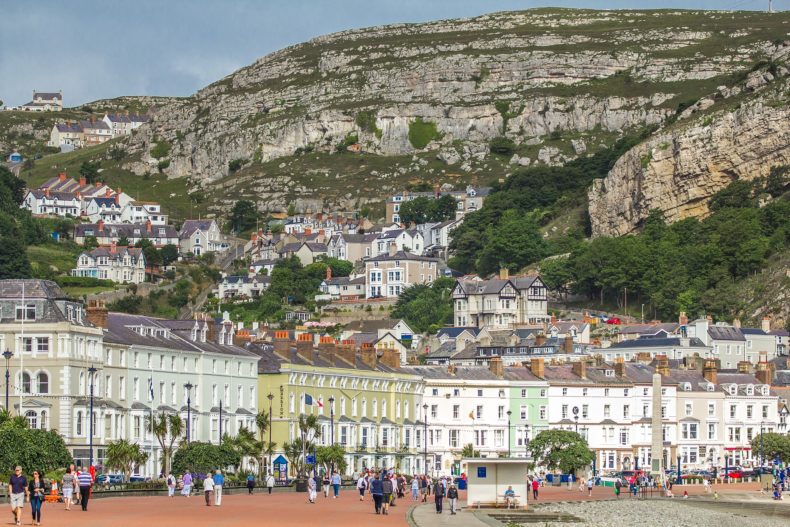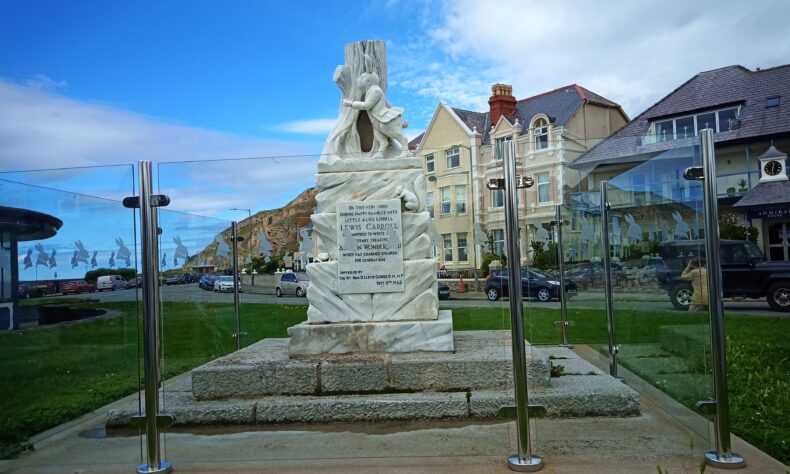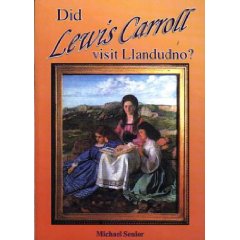Did Lewis Carroll visit Llandudno?

I was surprised to discover that whether or not Lewis Carroll visited Llandudno was a question people worried over. More surprised to discover someone had written a book about it. Even more surprised to discover that it has been an issue of “long and plentiful” debate which “has never been entirely resolved”. And then intrigued to discover, “the evidence is not always missing by mistake, but rather as a part of what appears to have been a cover-up”.
So how could I resist the opportunity to read an 82-page book, published in 2000, in order to discover why there might be a cover-up?
Llandudno has a plaque – unveiled in 1933 by David Lloyd George no less – which states, “On this very shore during happy rambles with little Alice Liddell, Lewis Carroll was inspired to write that literary treasure Alice in Wonderland which has now charmed children for generations”. This was part of a deliberate attempt to attract more tourism via having a famous author associated with the town. But is any part of this tale true?
The book gets off to an entertainingly circular start (and one with echoes of the internet) when the author, Michael Senior, points out that one of the first sources he looked at to discover the truth turned out to cite … himself.
Did Lewis Carroll visit Llandudno? is a neat mini-case study in just how hard it can be to track down the truth – or at least a fully documented plausible version of the truth – and how easy it is to stop at earlier points were apparently authoritative statements have been made which, under close examination, melt away, as in the case of one key letter:
It turns out that not only does nobody know where it is but that none of the people who quote from it so assertively have ever seen it.

Peeling back through history, we find a round of destruction of evidence that would show whether or not Lewis Carroll visited, followed later by a round of invention of evidence to justify the desire to cash in on the tourism benefits of a connection.
In the end, the book concludes that although the plaque’s wording is unquestionably false, with Alice in Wonderland having been inspired by tales told on river trips elsewhere, it is far from clear what really happened.
You too can enjoy this historical mystery by purchasing Did Lewis Carroll visit Llandudno? here.

“Did Mr Carroll visit Llandudno? Answer me – yes or no!”
It reminds me of something I read about historiography (the study of the study of history – in other words, discussing what history’s about). As I remember it, it was that a member of the Kaiser’s General Staff had written his memoirs after the First World War and had said, “Wir rechneten unbedingt mit England als Fremd.” This means, roughly, “We took it for granted that England would be an enemy.” However, “unbedingt” literally means “unthought” and a British historian whose German was not as good as he thought mistranslated this as “We considered it unthinkable that England would be an enemy.” On this was built an argument that Sir Edward Grey had failed to make Britain’s position sufficiently clear and if he had, Germany would probably have pulled back from war (there are other more valid arguments that Grey could have been more clear and emphatic – but the quote suggests Germany would not have been deterred). Other historians read the mistranslation and incorporated it in their own works, so it took on a life of its own.
I would question whether “unbedingt” literally means “unthought”.
Your “taken for granted” is closer, but it can mean things like “unconditionally”, “absolutely”, “implicitly”.
“Bedingt” can mean “conditional”, “limited”, “qualified”, and is related to the verb “bedingen”, which means things like “”to require”, “to condition”, “to necessitate”.
So, clearly a range of related meanings, but not (and nothing like) “unthinkable”, IMO.
Also, “Fremd” is “alien” or “foreign”, rather than enemy (“Feind”).
(unthinkable could be “undenkbar” or “unvorstellbar” (“unimaginable”)
So if that’s how he really translated it, it was a mistake, and not a particularly subtle or forgivable one.